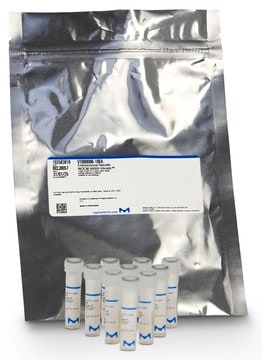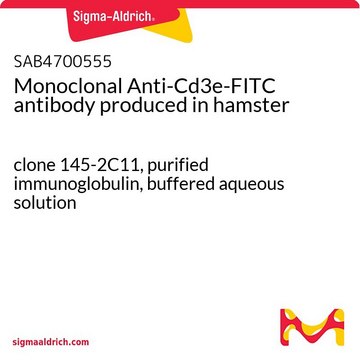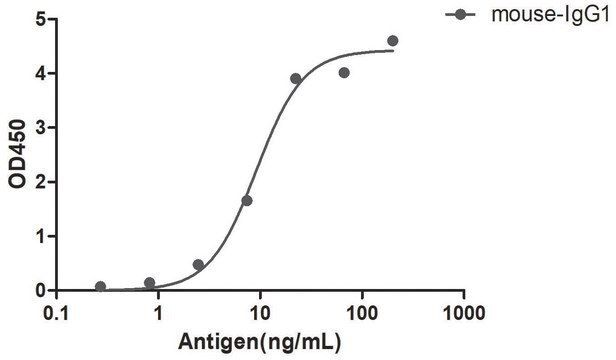MABF3032
Anti-CD3 zeta (CD247) Antibody
About This Item
Prodotti consigliati
Origine biologica
mouse
Livello qualitativo
Coniugato
unconjugated
Forma dell’anticorpo
purified antibody
Tipo di anticorpo
primary antibodies
Clone
6B10.2, monoclonal
PM
calculated mol wt 18.70 kDa
observed mol wt ~18 kDa
Reattività contro le specie
mouse, human
Confezionamento
antibody small pack of 100 μL
Isotipo
IgG1κ
N° accesso UniProt
Condizioni di spedizione
dry ice
Temperatura di conservazione
-10 to -25°C
modifica post-traduzionali bersaglio
unmodified
Informazioni sul gene
human ... CD247(919)
Descrizione generale
Specificità
Immunogeno
Applicazioni
Evaluated by Western Blotting in Jurkat cell lysate.
Western Blotting Analysis: A 1:500 dilution of this antibody detected CD3 zeta (CD247) in Jurkat cell lysate.
Tested Applications
Flow Cytometry Analysis: A representative lot detected CD3 zeta (CD247) in Flow Cytometry applications (Machado Diaz, A.C., et. al. (2012). Arthritis. 2012:943156).
Immunoprecipitation Analysis: A representative lot immunoprecipitated CD3 zeta (CD247) in Immunoprecipitation applications (van Oers, N.S., et. al. (1995). J Exp Med. 182(5):1585-90).
Immunohistochemistry Applications: A representative lot detected CD3 zeta (CD247) in Immunohistochemistry applications (Balkhi, M.Y., et. al. (2018). iScience. 2:105-122).
Immunofluorescence Analysis: A representative lot detected CD3 zeta (CD247) in Immunofluorescence applications (Lee, J., et. al. (2020). NPJ Biofilms Microbiomes. 6(1):49).
Western Blotting Analysis: A representative lot detected CD3 zeta (CD247) in Western Blotting applications (Aki, D., et. al. (2018). Nat Immunol. 19(7):766-775; van Oers, N.S., et. al. (1995). J Exp Med. 182(5):1585-90).
Note: Actual optimal working dilutions must be determined by end user as specimens, and experimental conditions may vary with the end user
Stato fisico
Stoccaggio e stabilità
Altre note
Esclusione di responsabilità
Non trovi il prodotto giusto?
Prova il nostro Motore di ricerca dei prodotti.
Codice della classe di stoccaggio
12 - Non Combustible Liquids
Classe di pericolosità dell'acqua (WGK)
WGK 2
Punto d’infiammabilità (°F)
Not applicable
Punto d’infiammabilità (°C)
Not applicable
Certificati d'analisi (COA)
Cerca il Certificati d'analisi (COA) digitando il numero di lotto/batch corrispondente. I numeri di lotto o di batch sono stampati sull'etichetta dei prodotti dopo la parola ‘Lotto’ o ‘Batch’.
Possiedi già questo prodotto?
I documenti relativi ai prodotti acquistati recentemente sono disponibili nell’Archivio dei documenti.
Il team dei nostri ricercatori vanta grande esperienza in tutte le aree della ricerca quali Life Science, scienza dei materiali, sintesi chimica, cromatografia, discipline analitiche, ecc..
Contatta l'Assistenza Tecnica.






